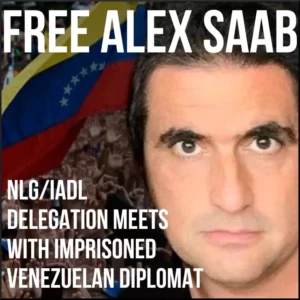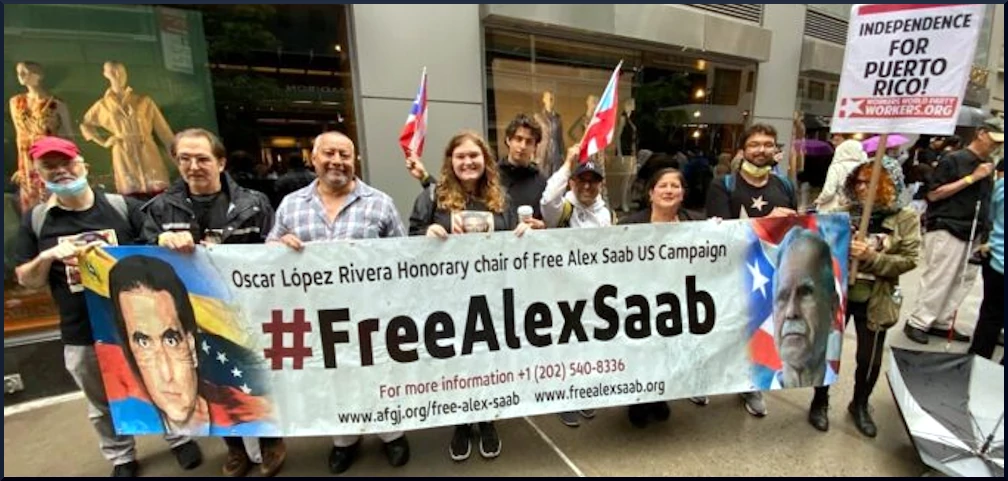“A Nuclear Bomb would be better. At least with a Nuclear Bomb we die quickly. With the U.S. Sanctions we die every day.” – Alex Saab
Members of the National Lawyers Guild (NFL) and International Association of Democratic Lawyers (IADL) met with Venezuelan special envoy and political prisoner Alex Saab this week in the Federal Detention Center-Miami. Audrey Bomse, a member of the NLG’s International Committee, and Suzanne Adely, NLG President and IADL Bureau Member, met with the imprisoned Saab to convey the support and solidarity of progressive lawyers in the U.S. and internationally and the growing movement for his freedom.
 Saab is only receiving legal visits, no visits from family or friends. Most outrageously, in violation of the Vienna Convention on Consular Relations, Saab has not been allowed contact with officials from Venezuela. According to Article 36 of the VCCR. which the U.S. has signed, “consular officers shall be free to communicate with nationals of the sending State and to have access to them.” Foreign nationals who are arrested or detained must be given notice “without delay” of their right to have their embassy or consulate notified of that arrest, and “consular officers shall have the right to visit a national of the sending State who is in prison, custody or detention, to converse and correspond with him and to arrange for his legal representation.”
Saab is only receiving legal visits, no visits from family or friends. Most outrageously, in violation of the Vienna Convention on Consular Relations, Saab has not been allowed contact with officials from Venezuela. According to Article 36 of the VCCR. which the U.S. has signed, “consular officers shall be free to communicate with nationals of the sending State and to have access to them.” Foreign nationals who are arrested or detained must be given notice “without delay” of their right to have their embassy or consulate notified of that arrest, and “consular officers shall have the right to visit a national of the sending State who is in prison, custody or detention, to converse and correspond with him and to arrange for his legal representation.”
“Saab is a victim of U.S. imperialism. He is being criminalized for challenging U.S. Economic Coercive Measures on Venezuela. The case against him has raised dangerous precedents of judicial abuse by the U.S. in enforcing these policies, applying U.S. laws extraterritorially in an attempt to violate the sovereignty and trade relations of independent nations.” said Adely.
Saab’s role in challenging Sanctions on Venezuela has made him a target of the U.S. government.
According to the New York Times, “Saab [was] widely believed to be the architect of the economic deals that [were] keeping the Maduro government afloat.” His role as “special envoy” for Venezuela to Iran, another nation targeted by unlawful U.S. sanctions, was to trade crude oil and gold for food, medicine, fuel and other material to keep the Venezuelan productive economy running despite the devastating effects of U.S. unilateral coercive economic measures (UCMs). Such UCMs are unlawful and acts of war under the UN Charter and International Law and Conventions. Despite this clear prohibition, the U.S. has gone as far as seizing millions of barrels of Iranian fuel headed to Venezuela on the high-seas to block these two sovereign nations from engaging in peaceful trade, thus evading the illegal American economic sanctions.
Saab was intercepted and seized unlawfully in Cape Verde as his plane was refueling on June 12, 2020, on his way to Iran in his role as special envoy for Venezuela. He was arrested without a warrant, with an Interpol red notice received only after his arrest on a series of charges related to violation of U.S. sanctions. He remained in this tiny island nation, where he was subjected to torture for over a year.
During the visit, Saab was unable to talk about what had been done to him, other than to say that he had been held in a small dark cell. He compared his torture to what went on in Guantanamo.
The purpose of his long detention and inhumane treatment in Cape Verde was, again according to the NYTimes, to get him to cooperate with U.S. authorities to “help untangle Mr. Maduro’s economic web of support and assist the authorities in bringing charges against other allies of the Venezuelan government.” Saab refused to cooperate and was eventually extradited to the U,S., although there is no extradition treaty between Cape Verde and the U.S. In an agreement with Cape Verde, the U.S. agreed to drop seven of the charges against him once he was extradited to the United States.
Saab’s case has deep implications for the respect for diplomatic status everywhere
The United States has consistently ignored Saab’s diplomatic status arguing that he was not acting in the capacity as special envoy for Venezuela, despite evidence. The federal court in Miami went further, ruling in a highly alarming decision that even if it could be established that Saab was acting as a special envoy, he would not be recognized as such because the U.S. does not recognize the legitimacy of the Venezuelan Government. The court stated:
“Only the President may determine which governments are legitimate in the eyes of the United States and which are not[.].. It is clear that the United States does not recognize the Maduro regime to represent the official government of Venezuela. Instead, ‘[t]he United States recognizes Interim President Juan Guaid[ó] and considers the 2014 democratically elected Venezuelan National Assembly, which he currently leads, to be the only legitimate federal institution, according to the Venezuelan Constitution…. Maduro’s regime has been deemed ‘illegitimate.’ Accordingly, any claim to diplomatic immunity asserted by a representative of the Maduro regime must also be considered illegitimate.”
The December ruling is a clear example of a legal decision grounded not in the law nor in principles of fairness and justice, but instead motivated by U.S. imperialist policies. The United States has no legitimate authority to dictate the policies of the government of Venezuela, nor to imprison diplomats by unilaterally declaring the governments of sovereign nations to be illegitimate. The U.S. Government has made it clear that one of its top foreign policy priorities is to depose the democratically-elected government of Venezuela and to replace it with one that will open Venezuela’s vast oil reserves to exploitation by US transnational oil companies.
In 2000, the Bolivarian Republic of Venezuela submitted a referral to the International Criminal Court, asking it to investigate U.S. sanctions against their country as a Crime Against Humanity. The referral pointed out the enormous economic impact of these policies on the civilian population of the country. However, unsurprisingly for the ICC, which has almost exclusively focused on African war criminals and is now focusing on Russia, no progress has been made in this matter.
Senior U.S. officials have openly admitted that they were aware of the devastating impact of the sanctions on the civilian population and yet continued to implement the Unilateral Coercive Measures against Venezuela in order to cause social unrest and facilitate regime change. This is seen as “collateral damage”, much like the deaths of half a million Iraqi children as a result of sanctions leading up to the U.S. regime change in Iraq.
The National Lawyers Guild and the International Association of Democratic Lawyers reaffirm their position: Washington must drop the charges against Alex Saab, respect his diplomatic status, free him from detention and lift the sanctions on Venezuela. It is imperative that progressive people in the U.S. continue to support freedom for Alex Saab and reject the judicial abuse of our courts which are acting as agents of U.S. imperialism. It’s equally imperative that we challenge the U.S. sanctions on Venezuela and the economic coercive measures imposed on nations throughout the Global South.
